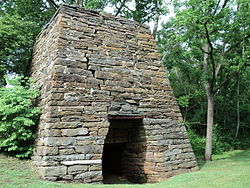Washington Iron Furnace
Washington Iron Furnace | |
 Exterior view Washington Iron Furnace | |
| Location | 108 Old Furnace Rd., Rocky Mount, Virginia |
|---|---|
| Coordinates | 36°59′13″N 79°53′31″W / 36.98694°N 79.89194°W |
| Area | 9.9 acres (4.0 ha) |
| Built | c. 1770 |
| NRHP reference No. | 73002014[1] |
| VLR No. | 157-0029 |
| Significant dates | |
| Added to NRHP | March 20, 1973 |
| Designated VLR | October 17, 1972[2] |
Washington Iron Furnace is an historic iron furnace, located in Rocky Mount, Franklin County, Virginia. The granite furnace was built around 1770, measures 30 feet on its south face, and was listed on the National Register of Historic Places in 1973.[3] Now one of the best preserved furnaces in Virginia, it was built against the side of a hill so iron ore, charcoal and limestone could be brought by wagon and dumped into the top of the furnace, although the original cart road and ten-yard-long bridge leading to the top no longer exist.
History
John Donelson (now perhaps best known as the father of Rachel Donelson, who married future U.S. President Andrew Jackson) and his son-in-law, John Caffery, built the furnace circa 1770 and operated it for about a decade. However, Franklin County would not be created until 1785, from Bedford, County and Henry County (which split from Pittsylvania in 1777). Therefore, Donaldson served on the first court for Pittsylvania County, as well as represented it in the House of Burgesses, and was its militia Colonel and county surveyor. The ironworks, originally simply called "The Bloomery", supplied Patriot forces in the American Revolutionary War.[4] the (still surviving) ironmaster's house later became known as The Farm. In 1773, four white men and six slaves carted the raw materials, stoked the fires and otherwise worked the furnace.[5]
In 1779 Donelson moved to Tennessee and sold the Bloomery to fellow former Burgess James Callaway (1736-1809) and his father-in-law Jeremiah Early (1730-1779; whose great-grandson Jubal A. Early later became a prominent Confederate general), both of Bedford County, Virginia. They named it "Washington Iron Forge" to honor George Washington. Calloway also owned Oxford furnace in Campbell County, Virginia with Henry Innes, and the Chiswell lead mines further southwest. Prominent landowner Jeremiah Early would soon die and bequeath his share to three of his sons, two of whom also soon died, so John Early sold his share to Calloway in 1781.[6] In 1820, the three Saunders brothers (one of whom married Jeremiah Early's daughter) purchased this and another furnace on Ferrum Creek from Calloway's heirs; by 1836 the Washington mine and furnace employed 100 men, and produced 160 tons of iron annually.[7]
A nearby vein of high quality magnetite supplied this furnace, and horse-drawn wagons took the refined iron bars and castings down the Carolina Road to North Carolina and Alabama. Reportedly in 1850, a dam on Furnace Creek uphill of the furnace burst, and the resulting water flow cracked the hot furnace, which was not rebuilt by the Saunders family then operating it. The mine would continue operations until 1880; the Pigg River Mining Company shipped ore to Pennsylvania until costs proved too high. The last shafts went 75 feet below the surface and soon filled with water.[8]
References
- ^ "National Register Information System". National Register of Historic Places. National Park Service. July 9, 2010.
- ^ "Virginia Landmarks Register". Virginia Department of Historic Resources. Retrieved 5 June 2013.
- ^ Anne Carter Lee (September 1972). "National Register of Historic Places Inventory/Nomination: Washington Iron Furnace" (PDF). Virginia Department of Historic Resources. and Accompanying four photos
- ^ Marshall Wingfield, Franklin County, Virginia: A History (Berryville, Chesapeake Book Company 1964) p. 82
- ^ NRIS Section 8
- ^ T. Keister Greer, Genesis of a Virginia Frontier (Rocky Mount, History House Press 2005) pp. 46-47
- ^ NRIS section 8
- ^ Greer pp. 82-83
External links
 Media related to Washington Iron Works at Wikimedia Commons
Media related to Washington Iron Works at Wikimedia Commons
- Industrial buildings and structures on the National Register of Historic Places in Virginia
- Industrial buildings completed in 1770
- Buildings and structures in Franklin County, Virginia
- National Register of Historic Places in Franklin County, Virginia
- Industrial furnaces
- Ironworks in Virginia
- 1770 establishments in Virginia




